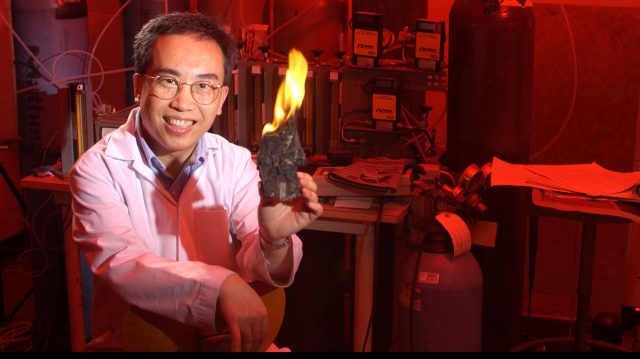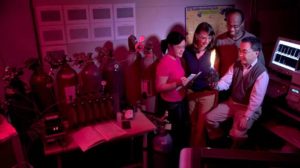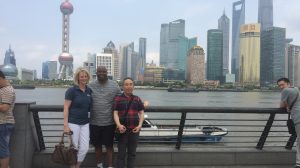
Wei-Yin Chen, professor of chemical engineering, demonstrates the flammable properties of coal. Photo by Robert Jordan/Ole Miss Digital Imaging Services
When Wei-Yin Chen moved from his native country of Taiwan to the United States, he envisioned becoming a mathematician. Nine years into a successful research career and ready for a change, he accepted a tenure-track assistant professor position in the Department of Chemical Engineering at the University of Mississippi.
Come June 30, after teaching hundreds of students and receiving dozens of recognitions, Chen will be retiring from the university he has loved and served faithfully for more than three decades.
“I will miss the beautiful Ole Miss campus tremendously,” said the professor of chemical engineering. “Tracy (his wife) and I walked to every corner of our campus during the COVID-19 era. It was fun to see hungry squirrels following us, and the campus from different points and times of the day. These scenes will remain images in our minds.”
A Tale of Two Cities and Four Degrees
Chen’s journey to America began in New York City. After he earned his bachelor’s degree in chemical engineering from Tunghai University in Taiwan, Chen migrated to the Big Apple in 1973 and began pursuing separate master’s degrees at two graduate schools.
He received Master of Science degrees in applied mathematics and chemical engineering from the State University of New York at Stony Brook and the Polytechnic Institute of New York, respectively, both in 1975. He earned his Ph.D. in chemical engineering from the City University of New York in 1982.
“I came to the U.S. with a goal to be an applied mathematician with special focus on stochastic (random) processes,” Chen said. “The energy crisis of 1970s broke out at the beginning of my graduate study, so I decided to tackle novel carbon conversion technologies for efficient and clean power generation.”
Better Prospects Called
Chen conducted contract research at Gulf South Research Institute and Louisiana State University for nine years in the 1980s. He joined the Ole Miss engineering faculty because he recognized it offered him better opportunities for professional growth.
“As a tenure-track assistant professor in 1990, it gave me a higher degree of freedom in performing my teaching, research and services,” he said. “I was promoted to associate professor and professor in 1993 and 2000, respectively.”

Wei-Yin Chen discusses his climate change research with students in his laboratory. Photo by Robert Jordan/Ole Miss Digital Imaging Services
Chen’s research has always been centered around the sciences and technologies of carbon conversion and applied mathematics. While the topic remains his major effort, he began thinking nearly 15 years ago about the rest of his career.
“My passion on mitigating the grand challenge of global climate change has guided (me) through my activities since then,” Chen said.
“Some of my peers told me that I was far too late at that time because CO2 capture had been an active research topic for about two decades at that time. I did not agree because what was done before on carbon conversion is a closely related issue while low-cost technologies are still to be developed.”
Finding His Niche
Deciding to commit to the issue of climate change, Chen formed the Sustainable Energy and Environment Group at Ole Miss. The move proved to be a breakthrough achievement for both Chen and the university.
“SEEG pioneered the use of ultrasound, light, nonthermal plasma, biological, chemical and magnetic methods to modify the material surface for carbon gasification, carbon activation for CO2 capture and wastewater treatment, soil amendment, anaerobic digestion, algae growth, electrode fabrication, desalination/deionization and so forth,” he said.
“The research of carbon activation for pollutants adsorption has been funded by the U.S. National Science Foundation in a four-year, $6 million study.”
Chen and his colleagues edited the multivolume “Handbook of Climate Change Mitigation and Adaptation” that has emerged as the leading reference on the subject. About 10 researchers at Ole Miss participated in the first two editions of the text. The third edition of the text is being edited.
“The UM library has a set of my donated books,” he said. “SEEG also offered lectures and seminar courses, developed experimental modules and established collaborations around the globe. Some of my peers now tell me that I am ahead of my time on climate change. Much work remains to be done.”
Teaching Is the Real Thing
Research recognitions and rewards aside, Chen said the most fulfilling aspect of his career has been teaching his students. He has taught upper-level undergraduate courses and graduate courses including thermodynamics, reaction engineering and mathematical courses including linear and nonlinear differential equations, stochastic processes and nonlinear dynamical systems.
“To be successful engineers, our students must be equipped with both fundamental concepts and computational skills,” Chen said. “Clear concepts are the pillars of inductive and deductive reasoning. Computational skills relate the knowledge to the actual issues. Fundamental concepts and computational skills allow practitioners, engineers and researchers to take challenges comfortably.”
To this end, Chen has been offering his own study guides and weekly recitation sessions. These pedagogical tools have been effective for large classes with large variations in students’ readiness.
“A commissioned review article of ‘Chemical Engineering Education’ considered my pedagogies for thermodynamics and reaction engineering the ‘best practice’ for junior faculty to know,” Chen said. “I was one of the few instructors listed in two of the five core course categories. A few students have decided to pursue their careers in applied mathematics after my introduction of these beautiful sciences.”
Receiving His Due
National and international recognition has its place, but for Chen, nothing is more rewarding than being honored at the local level.
“I believe that I was the first faculty member in the School of Engineering who received all the research, teaching and service awards,” he said. “I was also nominated twice for the university’s Distinguished Professor honor.”

Wei-Yin Chen (right) shares a moment with Marni Kendricks, assistant dean in the School of Engineering, and Nosa Egiebor, former UM executive director of global engagement, at the Huangpu River skyline in Shanghai during a 2015 trip to South China. Submitted photo
The much-in-demand scholar has served as a panelist, reviewer or adviser for research organizations in the U.S., China, Romania, Pakistan, India, Jordan, Malaysia and several other countries.
Chen has been an adjunct or visiting faculty at five universities in China and Taiwan. A prolific author himself, he is on the editorial board of five peer-reviewed journals.
“I have reviewed manuscripts and book proposals for over 65 journals and publishers, and have been considered an outstanding reviewer by many journals,” he added.
Fond Remembrances
Some of Chen’s colleagues, and current and former students expressed their appreciation for Chen and his contributions to their lives and careers.
Baharak Sajjadi remembered Chen being “kind as a close friend, supportive as a father, rigorous as an adviser and thorough in research.”
“Perhaps the most memorable experiences I had was related to the best gift I received from his side, the second edition of the ‘Handbook of Climate Change Mitigation and Adaptation,’ which is the result of his many years of passionate work and collaboration with hundreds of authors from all over the world,” said Sajjadi, research assistant professor in UM’s Department of Chemical Engineering.
“When he signed the handbook to me, he told me that I will see my name on the cover of the third edition. Soon, he invited me as one of the editors-in-chief of the third edition and placed my name ahead of his name. That opened a new window in my career. He is far beyond a supervisor to me. Far beyond.”
Wesley Mills, a 2019 mechanical engineering alumnus from Oxford, recalled helping Chen find a larger classroom for his students to take Engineering Analysis III exams.
“Our classroom in Anderson was very crowded and the desks were very small, too small to spread out a test and papers to work the test on,” said Mills, now a product engineer for Parker Hannifin Engine Mobile Original Equipment Division. “I look back and see him as not only a great professor but also as a friend. I would stop by his office in Anderson Hall and see how he was doing.”
Yanxi “Kritsa” Peng said Chen’s caring made her a better student and changed her career goals.
“Before each help session, I would come two hours early and wait outside his office to finish my (Engr 321 homework) assignment,” said Peng, a senior mechanical engineering major from Beijing, China.
“Dr. Chen noticed that pattern, and every once in a while, he would walk out of the office and ask if I had any difficulties with the homework. After explaining the problem clearly to me, he would make sure that I could also explain this problem clearly to him or to other students. With his help, I not only got an A on Engr 321, but I also made my future plan to become a professor because of him.”
Ready for the Next Chapter
The Chens are already planning what they will do in retirement.
“My wife and I enjoy reading biography and history books and watching also movies of the same categories,” he said. “I still have a few active research, editorial and writing projects that will be finished in the coming years. We plan to travel to different continents to visit colleagues, collaborators, friends and relatives during the retirement.”